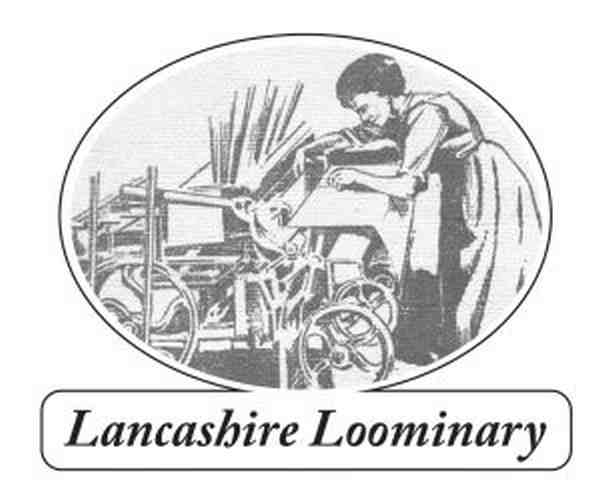The Northern Salvo
Incorporating Weekly Notices, Sectional Appendices, Lancvashire Loominary and Northern Weekly Salvo
Published at Station House, Kents Bank, Lancashire-North-of-the-Sands, LA11 7BB and at 109 Harpers Lane, Bolton BL1 6HU (also Lancashire) email: paul.salveson@myphone.coop
Publications website: www.lancashireloominary.co.uk
No. 317 March 2024
Salveson’s half-nakedly political digest of railways, tripe and secessionist nonsense from Up North.
Anniversaries and Aggravation
Apologies for the long gap since the last Salvo – various things have got in the way but here is the first offering for 2024. Several important anniversaries are coming up, the first being the Stockton and Darlington in 2025. ‘Railways 200’ is really taking off and there are some exciting plans in preparation. Following Railways 200 there’s the Bolton and Leigh 200th in 2028 (see below) and then the Liverpool and Manchester in 2030 (‘Rocket 200’), which I’m going to be closely involved with. Hopefully by then the railways’ troubles will be a distant memory. While it’s great news that RMT has settled, there is still little sign of a deal with the drivers’ union Aslef (who celebrate their 150th in 2030). I have to say my sympathy has moved much more towards the drivers, given the refusal of the Westminster Government to engage. It is a telling fact that it’s only this one body that is holding out against a settlement. 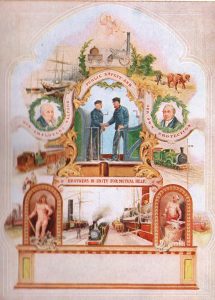 Wales, Scotland, London and Merseyside have all reached agreement with the drivers: why not Westminster? On a much more localized level, our station barrier staff at Bolton have been taking strike action this week. They are not directly employed by the train companies and have very poor working conditions. If anyone should be striking, they should. Their cause is being championed by RMT and The Salvo offers its full support (that’ll get the bosses quaking in their boots).
Wales, Scotland, London and Merseyside have all reached agreement with the drivers: why not Westminster? On a much more localized level, our station barrier staff at Bolton have been taking strike action this week. They are not directly employed by the train companies and have very poor working conditions. If anyone should be striking, they should. Their cause is being championed by RMT and The Salvo offers its full support (that’ll get the bosses quaking in their boots).
HS2: Digging an ever-bigger hole (and I don’t mean the tunnels)
The Government’s decision to scrap the northern (Phase 2) leg of HS2 without any sensible alternative plan is causing massive problems (Salvo 316). As readers will know, I’ve never been a fan of the project but we’ve ended up with a half-built scheme costing billions which will make precious little contribution to solving our transport problems, and could actually make them worse.
A recent report by the Commons Public Accounts Committee (PAC) confirms this. Chair of the committee, Meg Hillier, was highly critical of current Government intentions, commenting: “The decision to cancel HS2’s Northern leg was a watershed moment that raises urgent and unanswered questions, laid out in our report. What happens now to the Phase 2 land, some of which has been compulsorily purchased? Can we seriously be actively working towards a situation where our high-speed trains are forced to run slower than existing ones when they hit older track?”
Hillier is referring to the current notion that the new HS2 route beyond Birmingham will rejoin the West Coast Main Line at Handsacre, with the super-fast new trains using existing infrastructure to Crewe and beyond, which is not only slow but already congested, particularly in the Stafford area where tracks go down to just one in

each direction. Even more ludicrous the new trains will not go as fast as the current Pendolinos, which can tilt, meaning they can take curves at a higher speed than conventional non-tilting trains. The new trains planned for HS2 do not have tilt because the assumption was that most of the route they would be running on was largely straight.
A further problem with the current HS2 fiasco is that the logical southern terminus – Euston – is very much in doubt. The only commitment is to build as far as Old Oak Common, despite a huge amount of demolition work having taken place in the Euston area. The Government suggests that Euston will only go ahead if private sector investment can be found. The PAC report was highly sceptical that that investment can be attracted of the scale that would make the project viable.
Can anything be rescued from the mess? There is a desperate need to improve capacity on the West Coast Main Line (London to Glasgow)especially north of Rugby and have the entire route upgraded to four track, with speeds of at least 140 m/ph. Without that extra capacity there is a real risk that freight trains will have fewer paths than they have now.
Some of the land that was purchased for the abandoned Birmingham – Crewe section (Phase 2a), at a cost of £600 million, would be needed to provide some of that extra capacity but the Government is pushing to sell it off. Sooner or later, much of that land will be needed, when some degree of common sense returns.
Further north, regional mayors Andy Burnham (Labour, Greater Manchester) and Andy Street (Conservative, West Midlands) are working together to try and come up with a plan to connect the two major conurbations. I hope they will come up with a better alternative than the original plans offered, with an over-engineered ultra high-speed railway (225 m/ph) that massively inflated costs and environmental damage. As Street himself admitted “a lot of the cost in HS2 has come from this very uncompromising point about the speed.”
There’s no doubt that much better rail links between Manchester and Birmingham are needed. The current route is slow and rail has, perhaps unsurprisingly, a very small share of the market, at just 4%.
The two mayors have brought together a high-powered team to look at options and there have been suggestions that the private sector could stump up the investment. I have my doubts: it would be a big project and needs public investment on a large scale to get the best overall value. This would be exactly the sort of project that an incoming Labour Government, committed to a green economy, true ‘levelling-up’ of the country and creating jobs, should grasp with both hands. The recent announcement abandoning Labour’s green investment plans doesn’t augur well. It’s ironic that two regional politicians, Labour and Tory, are showing between them far more vision than any politician at national level.
Let the Public Accounts Committee have the last word: “HS2 is the biggest ticket item by value on the Government’s books for infrastructure projects. As such, it was crying out for a steady hand at the tiller from the start,” Dame Hillier said. “But, here we are after over a decade of our warnings on HS2’s management and spiralling costs – locked into the costly completion of a curtailed rump of a project and many unanswered questions and risks still attached to the delivery of even this curtailed project.”
Station Library doings:
The MIC Re-born! And occasional papers to be published, occasionally
Kents Bank Station Library continues to develop with well-attended monthly open days and talks (see below). For now, the Library will be open once a month, normally on the second Saturday of the month – the next open day is Saturday March 9th, from 11.00 to 3.30 pm. Entrance is via steps next to Beach Hut Gallery (also open). Teas, coffee and biscuits available – as well as sale of surplus books there is also an expanding ‘lending’ section.
The library is open for reference/study purposes by appointment – ring 07795 008691 or email info@stationlibrary.org.uk . We continue to receive generous donations of books and railway ephemera, which are very much appreciated. The Library has started a series of monthly
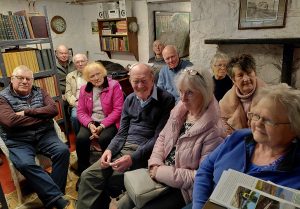
talks. We’ve christened them our ‘Mutual Improvement Class’ (MIC) reviving a railway tradition that goes back to the beginnings of the Railway Age. The most recent talk was Martin Bairstow, speaking on ‘Railways of the Lake District’. We managed to cram sixteen of us into the Reading Room but we’re looking at other options to accommodate a few more people, in comfort.
Our next ‘MIC’ is on Wednesday March 13th. Retired Blackburn locoman Raymond Watton who will speak on his ‘Memoirs of a Lancashire Engineman’. Raymond started his railway career at Lower Darwen shed, moving to Blackburn and then Preston depots. He was fireman on 70013 ‘Oliver Cromwell’ on the famous ‘Fifteen Guinea Special’ marking the end of steam on August 11th 1968. The talk is at 14.00 and must be pre-booked. Ring 07795 008691 or email info@stationlibrary.org.uk .
We’re also going to start publishing ‘occasional papers’ on aspects of railway social history. The first will be a three-part paper by John Kolodziejski, ‘London Bridge Freight Guard: Life on BR on the 70s’. John went on to become a journalist with the FT; this memoir offers a fascinating glimpse into life during a period of rapid transition on the railways. It will be posted on the library website shortly. Keep an eye out on www.stationlibrary.org.uk Contact details: Paul Salveson on 07795 008691 or info@stationlibrary.org.uk
Postal address: Station House, Kentsford Road, Kents Bank, Grange-over-Sands LA11 7BB The Library’s website is www.stationlibrary.org.uk
Dear friends departed: Valerie Hirst
It’s sad that this is becoming a regular feature of The Salvo. My very close friend Valerie Hirst died in January and her funeral, at Friends’ Meeting House in Huddersfield, took place on February 14th. I first

got to know Valerie on the Penistone Line Music Train, in 1994. She always made an impact and she certainly did that on the music train, getting passengers off their seats to jive along the train. We became great friends and had some lovely trips to the east coast and Dales. She spent much of her early life in the NHS, becoming a Community Psychiatric Nurse. She trained as an Alexander Technique teacher, a job that she took to with her usual gusto. In more recent years she took up photography and became a brilliant landscape photographer, winning numerous competitions and becoming an active member of the Huddersfield Camera Club. She was a very spiritual person, fascinated by mysticism and alternative lifestyles. She was a great traveller; despite having ME she managed to get to Crete every year and made many good friends from around Europe during her trips. She will leave a very big hole in many people’s lives, mine included.
Railwaymen (and women!) Remembered
The following personal account of one railwayman’s life came out of an oral history class I taught, called ‘Railwaymen Remember’, for the University of Leeds in 1994. The class members were mostly retired drivers, a few former guards and signalmen and one remarkable lady,
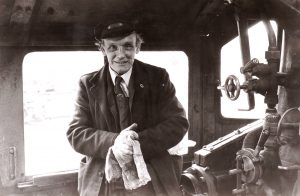
Eunice Bickerdyke, of Normanton. The stories were put together as ‘Messroom Gossip’, but were never published. I’m hoping to feature some of the stories in the next few issues of The Salvo. Hope you enjoy them! Here’s the first…
Ralph Burnell, Driver, Stourton
Ralph started on the footplate at Stourton (Leeds) at the age of 14 in 1942. He was made a fireman in 1948, and passed out for driving in 1964. He retired in 1987 after nearly 45 years’ service. I don’t know what became of him but if anyone does know anything (I have to assume he has died, but if still going he will be in his mid-90s) please get in touch.
“When I started at Stourton I worked as a caller-up and messenger boy. I had to advise men of altered turns of duty. There were a lot of specials then: troop trains, petrol trains, and other wartime special workings. On the afternoon turn I would advise twenty to thirty men: drivers, firemen, guards. I would then take the letters to Leeds City Station. One night, during the blackout, there was a thick fog and an air-raid warning. I ended up staying the night at the Queens Hotel!
When I was 16 I got passed for firing duties, but was put on nights as a knocker-up, since I new the knocking-up area. I used my bike, but we only had paraffin lamps.
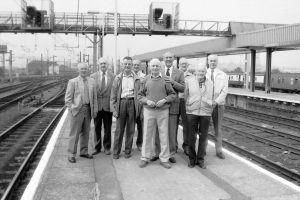
If you held up the lamp to see the street name, the oil would run down your arm. Men were usually given an hour or so to get to the shed, but sometimes a driver and fireman might live a mile or so apart. If the bike had a puncture – a frequent event since inner tubes were in short supply – it was a mad dash from one to the other. You’ve got to remember the black-out was on, and there were no street lights. Everything was pitch black. One night, I had an experience which made my hair stand on end. A dog came up and licked my hand – but I couldn’t see it, it was so dark!
If a man missed being called he could come down to the shed at 9 a.m. and get a day’s pay. One fireman tried this on, but didn’t get paid. It turned out that the knocker-up had been round but couldn’t wake him up. But he’d managed to wake all the rest of the street in the attempt!
I was in the Leeds Home Guard. I had a problem with boots – I couldn’t get any. I was then called up into the regular army in 1943, and it was expected you’d present yourself in your Home Guard uniform, boots included. All I had was a disgusting pair of second-hand ones. When I turned out on parade, the sergeant-major took one look at them and had me arrested! So twenty minutes after joining the army, I was in prison! Fortunately they rang Leeds and they confirmed my story, and I was let out to pursue a distinguished military career!
Footplate Food
I’ve had a few fry-ups on the firing shovel, when we could get some bacon. We’d also roast onions on the engine. I had a driver who would bring his kippers and warm them up, then put them in a bread cake and eat the lot – including head and bones! I once took 2lb of kippers for me and my second-man, when we were on station pilot duty. He was taken for another job, so I was single-manned and had to eat the lot myself.
I was stationed in Palestine during the war, working as a driver. We used to do bacon fry-ups on the firing shovel – but if you had a Moslem fireman you’d be in trouble!
There was a Holbeck driver called Gladstone Simpson – JP – he was very proud of
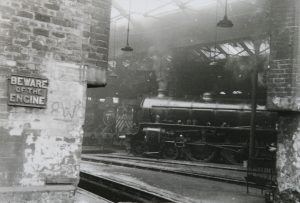
that, and he used to start off cleaning the shovel with the degging pipe. He’d stick the shovel in the firehole to burn the remaining dirt off, and then add the bacon and eggs. It was a great ritual for him!
We’d often cook onions in the cab. We’d stick one behind the injector handle and it would cook a treat. It was quite a common delicacy. It would roast slowly, and be a delicious treat after an hour or so. My mate used to take his false teeth out first, wash them out in a firing bucket, then eat his onion.
Characters
Ernie Rainford was called “The Vicar”. He lived in Hunslet by the vicarage. On one occasion a knocker-up arrived at what he thought was Ernie’s door, very early in the morning. A bad-tempered man came to the door and was told it was time to get up. He answered “Don’t you know who I am? I’m the Vicar of Hunslet!” To which the knocker-up replied “I don’t care who you are, but you’re on the 2 a.m.!”
Ernie had the distinction of being fond of animals, and on one occasion brought a donkey into the mess room. It left its calling card.
The shed foreman was called ‘Barber’ and everyone knew him as ‘Ali’ – but not to his face. He had a big car, and one day Ernie and his mate ‘stowed away’ in the back seat when he was going home. When they wanted to get out, Ernie tapped him on the shoulder, and said to the surprised foreman – “Let us out here Ali.” They got a bigger surprise when he took them a further five miles out of their way!
There was one driver known to one and all as “Deep Depression”. If you said ‘Good Morning’ to him, he’d say “It’ll rain before dinner time.” Another was called ‘Fish Billy’. He always had a cold fish from the fish shop, which he would warm up on the shovel. One day his mate was driving: he opened the regulator hard and the fish was sucked into the firebox – well and truly cooked!
Lodging
There were some important unwritten rules in lodging. Driver and fireman often had to share the same bed. The youngest man – the fireman – always slept nearest to the wall; you couldn’t get up until the driver did!
There was one very funny character who was a driver at New England, Peterborough, and transferred to Ardsley. His reputation for being mad had gone before him. On his first day he walked into the mess room and announced to the throng “They tell me there’s a lot of lazy buggers around here – well meet the new champ!”
If a driver was learning the road and he got on with him, it was normal for the poor man to be left to himself. He would retire into the train with a casual “I’ll see you gentlemen in Leeds!”
Casey was another character. He’d cause trouble anywhere. If he walked into a quiet room, he’d walk out with a riot going on. He became known as ‘Sailor’. He was on a job to Cleethorpes and it was common to take the ferry over to Hull to get a train home passenger. One night the boat got stuck on a sandbank in the middle of the Humber and it was 24 hours before he booked off.
I started with another lad on the same day, and we were the same age. So we tossed a coin to see who’d be the senior man. I won – and the chap who lost reckoned it cost him about £1500 in wages over the years. Promotion was invariably on seniority grounds for wages grades. In clerical grades seniority was important, but not the sole consideration.
Diesels Arrive
Stourton closed in 1967 and I transferred to Holbeck. In 1978 I moved to Leeds City and joined the railcar link, where there was no night work. When the diesels arrived they were a source of controversy. Some men swore by them, others swore at them. If you spat on the rail they’d slip and slide, some of them. There were always problems with non-compatible couplings, and with brake blocks. BR made a big
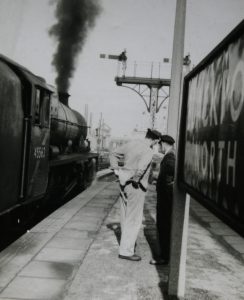
mistake in introducing too many different types. They should have gone for a smaller number of standard types, which is what we’ve finally got.
Some blokes loved railways, and would work for nothing. Harry Holroyd came up for retirement and didn’t want to finish, even though he had a 6-track model railway in his cellar to play with!
I met a lot of nice people on the railcars. One train I used to work every other week was called the ‘Bingo Special’. We used to bring people from Castleford, Pontefract and Knottingley into Leeds, arriving at 7pm for the bingo hall near City Station. We’d take them home at 9.45 When I retired in 1987, I received a number of retirement cards from the ladies who used the ‘Bingo Special’. One was headed ‘To the driver of the Orient Express Bingo Train’. I also got a large box of Liquorice Allsorts from the ‘Ladies of Pontefract and the Sweetie Girls of the 6.45 Train’. One of them wrote a poem in my honour, which I’ve still got!”
A Forgotten Railway ‘First’: Bolton and Leigh, 1828
The Bolton and Leigh Railway opened in 1828 and was the first public railway in Lancashire, preceding the Liverpool and Manchester by two years. It connected in to the Liverpool and Manchester at Kenyon Junction (via the Kenyon and Leigh Railway) opening for through passenger traffic in 1831. The main function of the Stephenson-built line was to shift coal, and it connected the major collieries in the Leigh and Atherton area with Bolton. The line featured some severe gradients, at Bolton (Daubhill) and Chequerbent, requiring rope
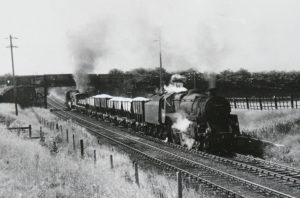
haulage. Eventually, in 1885, two diversions were built which removed the need for the rope haulage but Chequerbent Incline remained a fearsom clim at 1 in 30 – though this slipped to 1 in 18 as a result of mining subsidence. Regular passenger traffic finished in 1954 though a young Salvo travelled on a Bolton Holidays excuirsion from Great Moors Street to North Wales in 1958. Freight traffic carried on into the mid-60s. There is growing interest amongst some Bolton folk in celebrating the 200th anniversary. Recently, a small gathering of local councillors and other interested parties had a look at some remaining features of the pre-1885 route
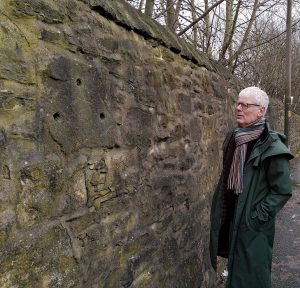
and were surprised at what still remains: including some of the original stone sleepers which have been incorporated into a stone wall. We were shown some historic artefacts and photos by the owner of Majestic Motors, which is on the route of the 1828 line at the site of Sunnyside Mills. Please get in touch via The Salvo if you’d like to be involved in plans to mark the anniversary.
Walt Whitman and Northern Socialism
This is an outline of my talk for Wakefield Socialist History Group on February 23rd 2024, at The Red Shed. My book With Walt Whitman in Bolton gives a fuller account of the connections but is almost out of print. I’m looking at doing a new edition.
The great poet of American democracy, Walt Whitman, had a huge influence on the early British socialist movement. The man whom many acclaim as the United States’ greatest-ever poet had very close ties with a group of friends, many of whom were active in the Independent Labour Party (ILP), in Lancashire. Each year, on May 31st, they celebrated Whitman’s birthday on the Lancashire moors with
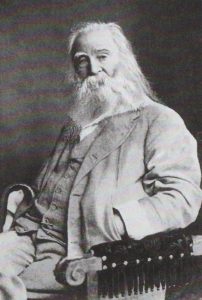
readings from his poetry, wearing sprigs of lilac and passing round a loving cup of spiced claret. Since 1985 the tradition has been revived, and has become a popular event for both socialists and the gay community.
The central figure in the Bolton group was J W Wallace, an architect’s assistant with Bolton firm Bradshaw Gass and Hope. He was a close friend of both the Glasiers and Keir Hardie, and a member of the ILP’s National Administrative Council. Wallace used this position to promote his almost fanatical devotion to the prophet of comradeship and the open air and had some measure of success.
Most socialist publications in the 1890s carried adverts for ‘Leaves of Grass’, Whitman’s ever-changing collection of his writings, and his poetry featured in most collections of socialist verse. Labour’s Garland – Poems for Socialists, published by The Huddersfield Worker and edited by James Leatham included an excerpt from Whitman’s prose on the cover and part of ‘Song of the Redwood Tree’ and ‘To a Foil’d European Revolutionaire’ amongst the poetry.
What made him so popular? Whitman cut a striking figure, with a shock of white hair and beard, wearing a cap perched at a jaunty angle. He was almost sanctified by the early socialist movement in England, particularly in the North. The Bolton socialist Allen Clarke wrote in 1919 that ‘it is fitting that Bolton should be distinguished above all towns in England by having a group of Whitman enthusiasts, for many years in close touch, by letter and visit, with ‘the Master’, for I am sure Walt Whitman, the singer of out-door life, would have loved to ramble our Lancashire moorlands.’ (published in book form in ‘Moorlands and Memories’, Bolton, 1920).
The correspondence with Whitman started with a birthday greeting sent in 1887, signed by Wallace and his friend Dr John Johnston. Whitman was touched, and there began an exchange of letters which cast a lot of fascinating light on Whitman himself and on life in Lancashire in the late nineteenth century.
Whitman died in 1892, but by then a firm friendship with other American ‘Whitmanites’ had been established with this small group of enthusiasts in the town which was then at the heart of the Lancashire cotton industry. They called themselves ‘The Eagle Street College’ after the modest two-up two-down terraced house where the group’s mentor, J.W. Wallace, lived with his parents in the mid-1880s. They used to meet at Wallace’s home each week to discuss Whitman and other great thinkers and poets of the time. Wallace moved to Adlington, a small village on the edge of the Bolton moors, in the mid-1890s and this encouraged the group to come to visit and explore the magnificent scenery around Rivington and Anglezarke.
The highpoint of the group’s social calendar was the celebration of Whitman’s birthday. The day included a brisk walk up to Rivington where they would be entertained by the Unitarian minister Samuel
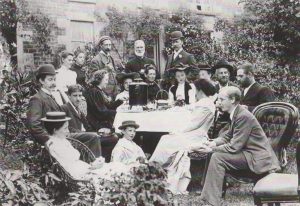
Thompson. There would be readings from ‘Leaves of Grass’ and the passing round of a ‘loving cup’ containing spiced claret. More of ten than not Wallace would deliver an ‘address’ on the political and spiritual significance of Whitman. But basically they had a good time and were able to work off the claret on the walk back down to the railway station at Adlington.
The group were, at least initially, mainly lower middle-class men who included clerks, a journalist, clergymen and one or two skilled workers. They were not a metropolitan intelligentsia, but neither could they be described as representative of Bolton’s industrial working class. They were probably typical of the sort of person drawn to the young Independent Labour Party with its message of ethical, rather than Marxian, socialism. As Fred Wild, an early member of the group commented ‘these young men were all from the Parish Church and for the most part were engaged as clerks or minor gaffers and were attracted to Wallace by his personality and intellectual powers.’
Wallace had a wider circle of friends who were infected by his love for Whitman, including Keir Hardie, founder of the Labour Party, who frequently visited him in Adlington. Edward Carpenter, Robert Blatchford and the Irish co-operator Horace Plunkett were amongst his friends and correspondents. Whitman and Carpenter were particularly close friends and Carpenter visited the poet in America. Whilst Carpenter was overtly gay, Whitman kept his sexuality something of a mystery, though America’s modern gay community has claimed him as their own. Much of his poetry is a powerful celebration of love between men, with some strongly erotic themes and imagery. Equally, he was the poet of spirituality and comradeship, and love of the open air.
Whitman’s birthday will be celebrated, as usual, on the nearest Saturday to his birthday (May 31st), which means it should be Saturday June 1st. Details in a future Salvo.
Lancastrians: Mills, Mines and Minarets
February has been a busy month for talks on ‘the book’ with well-attended audiences in Blackburn, Rawtenstall and Padiham in particular. More talks are planned on aspects of my new book on Lancashire history and identity. There’s a bit of a lull in March apart 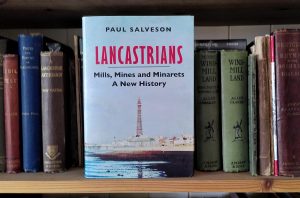 from a lecture for the Historic Society of Lancashire and Cheshire, at Liverpool’s Athenaeum, on March 20th. Please contact me if you would like more details.
from a lecture for the Historic Society of Lancashire and Cheshire, at Liverpool’s Athenaeum, on March 20th. Please contact me if you would like more details.
The book itself isn’t a ‘conventional’ history and covers different themes of Lancashire history, including sport, culture, politics, industry and religion. It explores the Lancastrians who left for new lives in America, Canada, Russia and South Africa, as well as the ‘New Lancastrians’ who have settled in the county since the 14th century. There are about forty ‘potted biographies’ of men and women who have made important (but often neglected) contributions to Lancashire.
It’s available, published by the highly-respected publishers Hurst whose catalogue is well worth a look at it. See https://www.hurstpublishers.com/catalogues/spring-summer-2023/.
The book is hardback, price £25. Salvo readers can get a 25% discount by going to the publisher’s website (www.hurstpublishers.com) and enter the code LANCASTRIANS25 at checkout.
Station Buffet Bulletin
We’re re-starting this column, by popular request. The first item is based on a press release from Merseyrail and is on my ‘must visit’ list for the Spring:
NEW COMMUNITY COFFEE SHOP FOR MAGHULL
Two young entrepreneurs have launched a new coffee shop at Maghull station, providing not only refreshments for commuters and travellers, but a hub that aims to be a focal point for the local community. The Coffee Carriage recently opened in the station’s ticket office and provides a warm, cosy seating area for customers. With artisan pastries and a range of freshly baked produce, the new shop is a must-visit for foodies in the area. Craig Reeves, who runs Coffee Carriage alongside Rory McLellan, said: “Our customers can expect a friendly and welcoming place, almost like a second home.
“We will be providing barista coffee from a traditional espresso bar, as this is what customers have come to expect now when visiting any good coffee lounge. “We will also be offering freshly baked morning pastries, breakfast rolls, cakes and other treats.”
And Craig has revealed ambitious plans for the Maghull coffee shop. He said: “We will be looking into having events in the mornings, together with afternoon teas, Sunday strolls and so on. We want to make this a little hub for the local community and become a part of it. Our opening times will be Monday to Friday from 6am – 4pm, Saturday 8am – 4pm. However, these times will be reviewed and adjusted to meet the demand.
Suzanne Grant, Deputy MD of Merseyrail, said: “We’re delighted to be able to welcome Coffee Carriage to Maghull station, and I’m sure customers and local people will be impressed with this fantastic new facility. Rory and Craig’s business is a great example of some of the opportunities available on the Merseyrail network, and we’d love to work with any local independent businesses who are interested. We’re open to any ideas, so do please get in touch by emailing propertyenquiries@merseyrail.org.
Reading for the train
Our good friend John Davies has just published another book of his railway memoirs. Commercial: It’s not railway work is the slightly ironic title of what he describes as my remarkable journey from Swansea District Office to Regional Railways Manager, Wales.” Highly recommended – £14.99 from Amazon. (A longer review will follow in the next issue).
Still in Print (at special prices)
ALLEN CLARKE: Lancashire’s Romantic Radical £5.99 (normally £18.99)
Moorlands, Memories and Reflections £15.00 (£21.00)
Last Train from Blackstock Junction (published by Platform 5 Books). A collection of short stories about railway life in the North of England. Salvo readers can get the book at a specially discounted price, courtesy of Platform 5 Publishing. Go to https://www.platform5.com/Catalogue/New-Titles. Enter LAST22 in the promotional code box at the basket and this will reduce the unit price from £12.95 to £10.95.
The Settle-Carlisle Railway (published by Crowood £24) – can do it for Salvo readers at £12
See www.lancashireloominary.co.uk for full details of the books (ignore the prices shown and use the above – add total of £3 per order for post and packing in UK)
